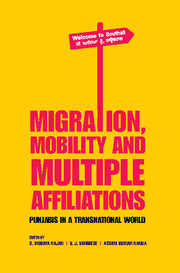Book contents
- Frontmatter
- Contents
- List of Tables and Figures
- Preface
- Acknowledgements
- Transnational World and Indian Punjab: Contemporary Issues
- Part I A Historical Survey
- Part II Shifting Contours of Migration
- Part III Social Structures and Organizational Links
- Part IV Education and Migration
- 11 Sending Children ‘Back Home’ for their (Mis)education
- 12 Transnational Health Institutions, Global Nursing Care Chains, and the Internationalization of Nurse Education in Punjab
- Part V Family Networks
- Contributors
- Index
12 - Transnational Health Institutions, Global Nursing Care Chains, and the Internationalization of Nurse Education in Punjab
from Part IV - Education and Migration
Published online by Cambridge University Press: 05 March 2016
- Frontmatter
- Contents
- List of Tables and Figures
- Preface
- Acknowledgements
- Transnational World and Indian Punjab: Contemporary Issues
- Part I A Historical Survey
- Part II Shifting Contours of Migration
- Part III Social Structures and Organizational Links
- Part IV Education and Migration
- 11 Sending Children ‘Back Home’ for their (Mis)education
- 12 Transnational Health Institutions, Global Nursing Care Chains, and the Internationalization of Nurse Education in Punjab
- Part V Family Networks
- Contributors
- Index
Summary
Introduction: Nurse training and export from Northern India
Despite a flurry of books and chapters recently published on the international migration of nurses, there is relatively little academic and policy analysis of India's changing role in the supply of nurses for global export. The literature that does focus on India provides a rich analysis of mostly south Indian migrant nurses, but relatively little research examines the current transformations occurring in northern India, including Punjab, the changing role of relevant institutions, and how this intersects with health education and governance. This chapter offers an examination of international nurse migration with specific reference to Punjab. As with southern India, nursing as an export industry is developing in Punjab, and the locality is being inserted into diverse transnational nurse migration circuits through educational and labour brokerage networks. Understanding both the structural and social dimensions involved in this process demands that the author explores the regional complexities of nurse migration in India.
Nurse migration involves a number of actors in the private and public sphere. It is also a migratory process that demands the inclusion of the State in the regulation and maintenance of training and registration standards (Yeates, 2009a). There are also increasingly more international conventions in areas such as the trade in services and international ethical recruitment that affects the recruitment of foreign trained nurses; these conventions require the state to maintain standards and negotiate bilateral relationships when appropriate (Kingma, 2006), but training and recruitment are also highly profitable for the private sector. There are legislative, economic, social and discursive factors relevant to the systems within which Indian trained nurses are registered and employed, and how the mobility of these skilled workers is orchestrated through what has been termed the nursing ‘carousel’ (Kingma, 2007), or industrial nurse migration complex (Yeates, 2009b). One essential component of this process is the nursing education sector, including the private, public, domestic and international sections of this, and increasingly, hybrids of these. Exploring how the export of nurses is facilitated though educational sector transformation offers evidence of how transnational processes have become embedded into national space, and how regional structures interface with and inform such processes.
- Type
- Chapter
- Information
- Migration, Mobility and Multiple AffiliationsPunjabis in a Transnational World, pp. 296 - 316Publisher: Cambridge University PressPrint publication year: 2015
- 3
- Cited by



